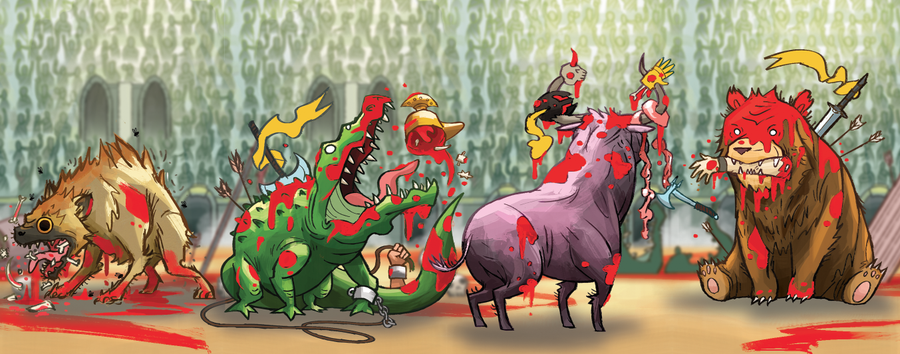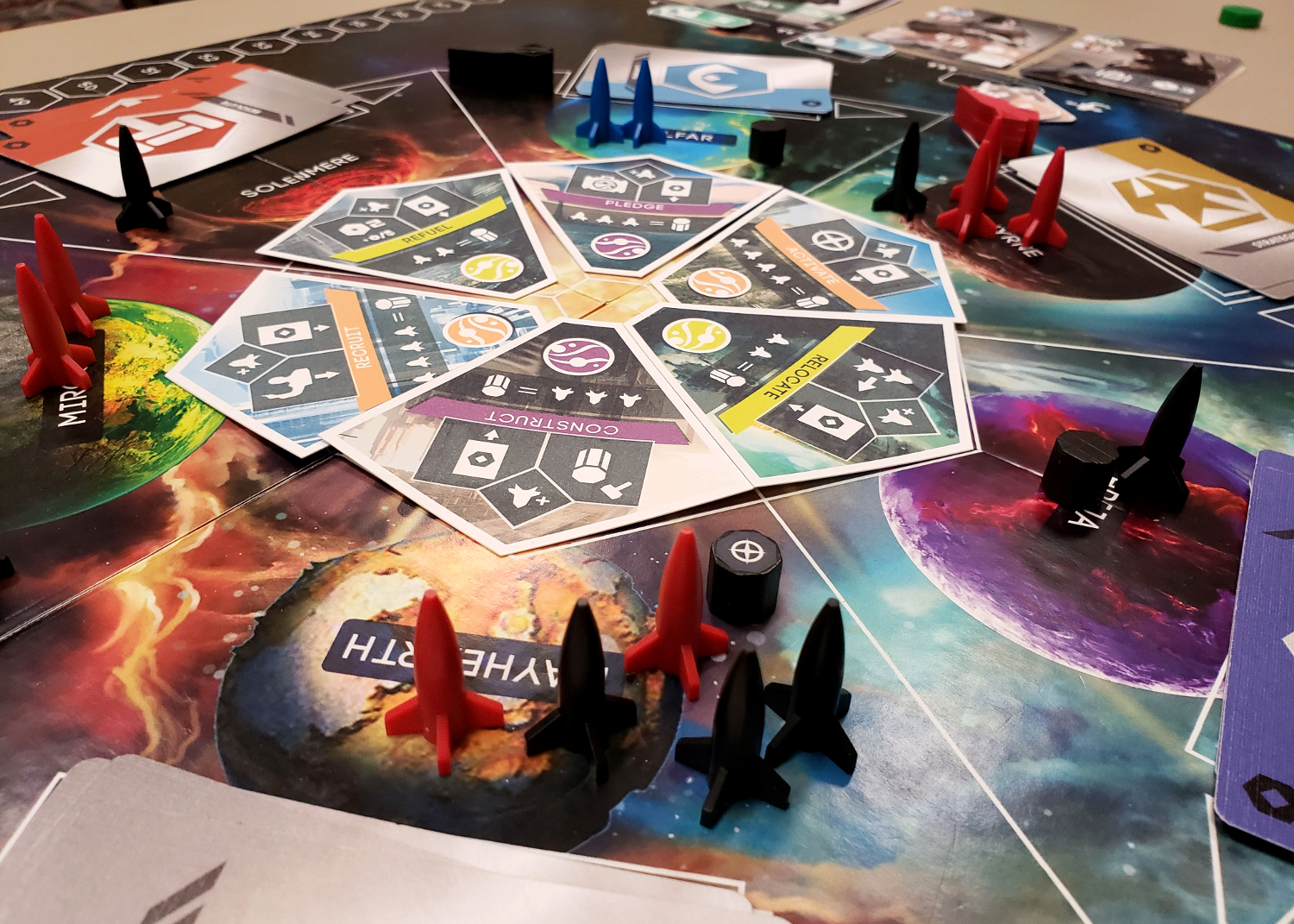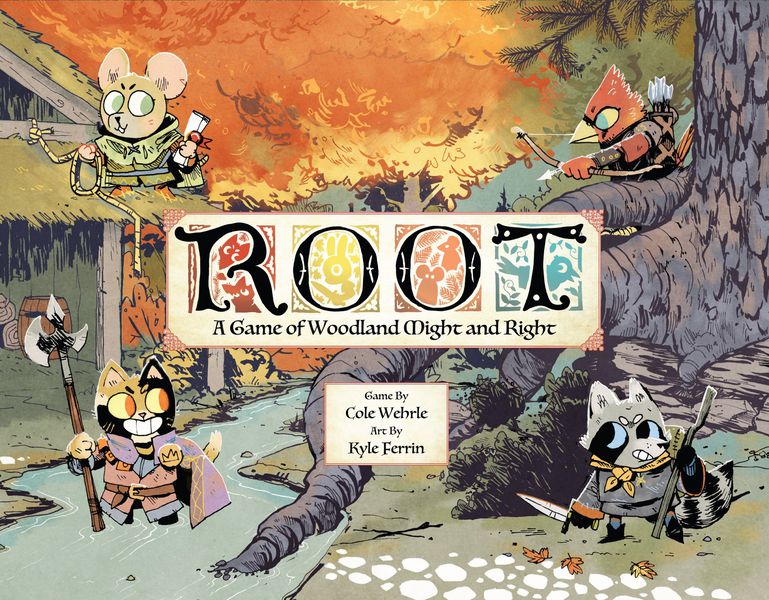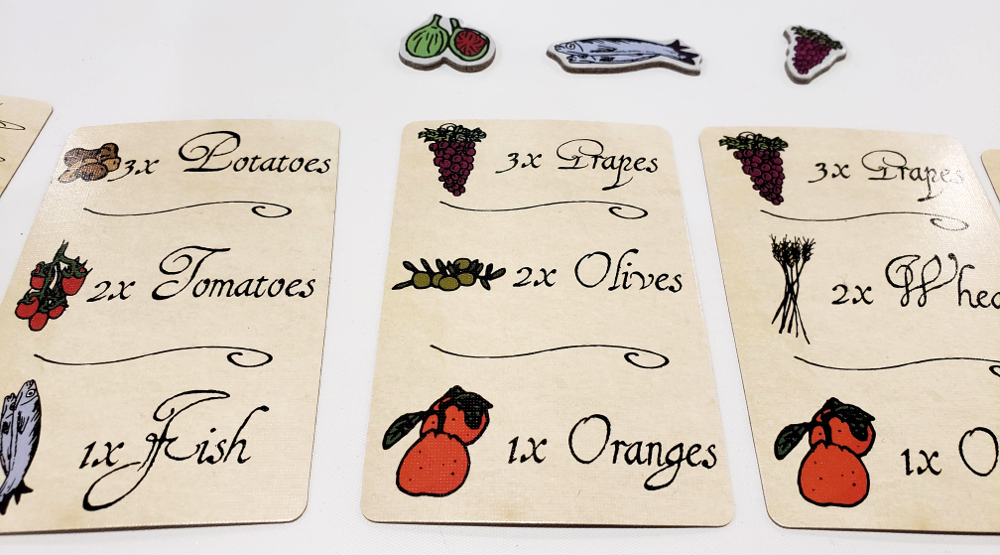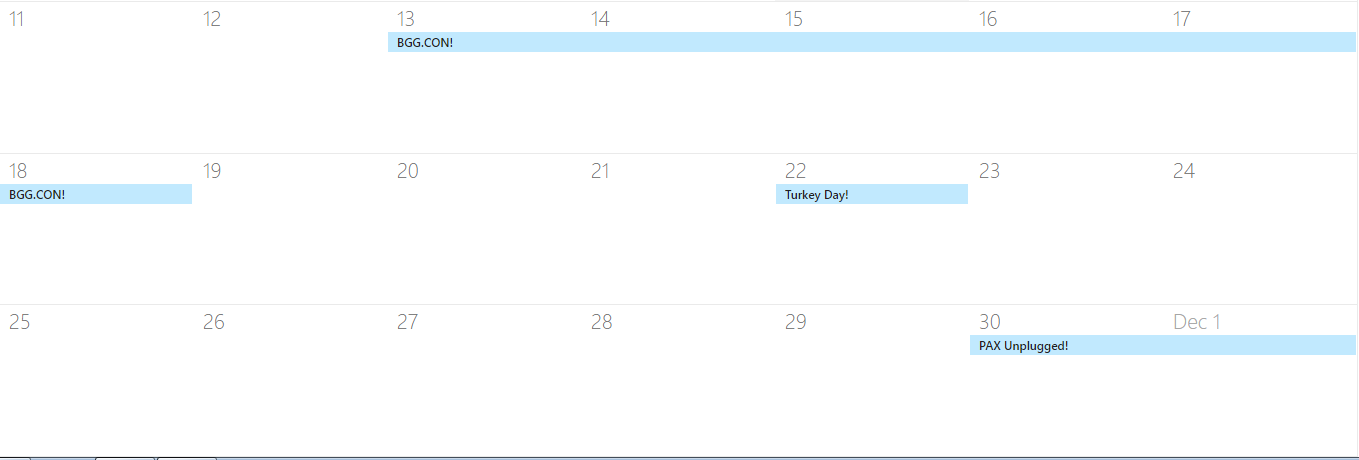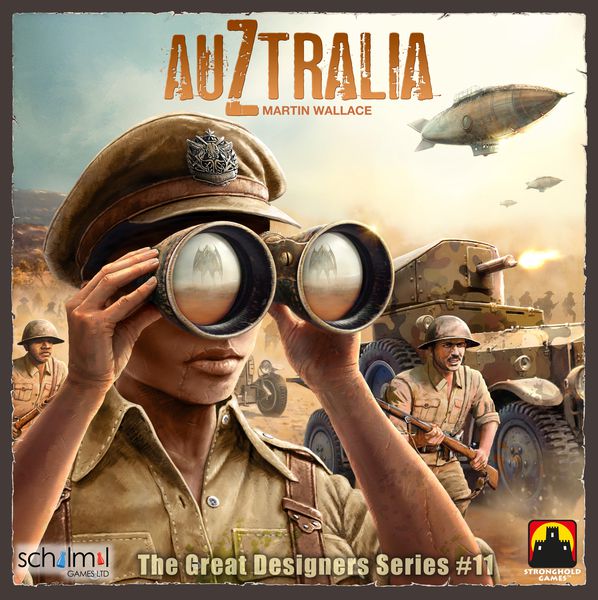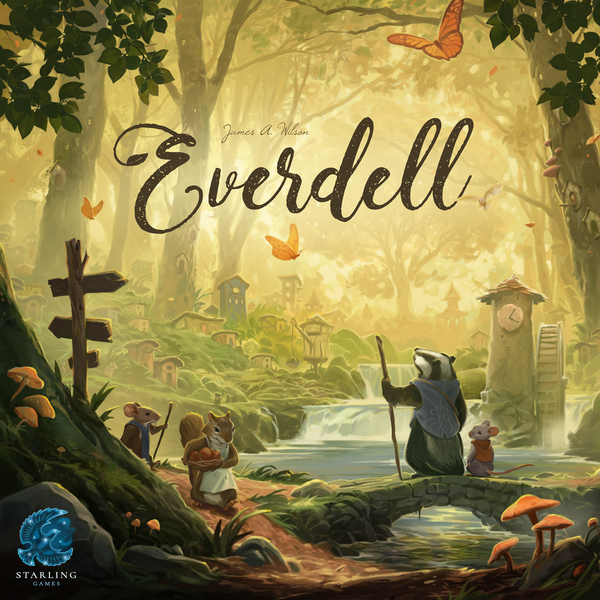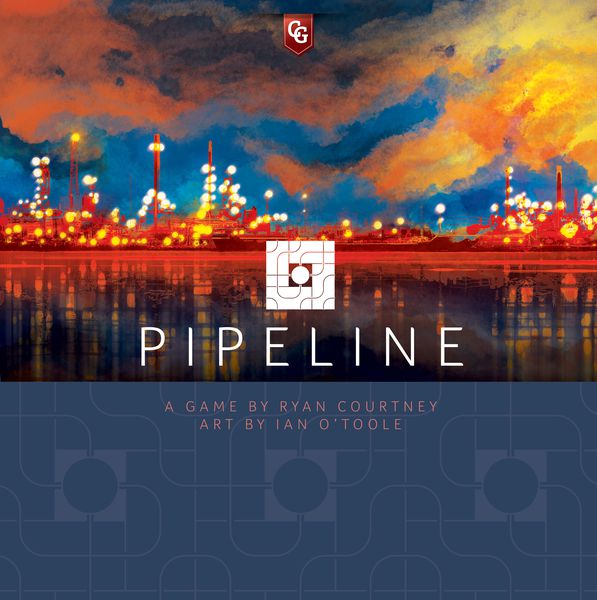The Good
Games Galore
When you want a slew of new games being paraded about, you simply can’t top Gen Con in the US or Essen in Europe for the degree of excitement they entail. Likewise, many smaller game conventions focus more on actually playing games than buying them. Sure there are still almost always vendors present, but the focus remains largely on the people you’re playing with more than the game itself.
Until the advent of Unplugged, the only mid-sized board game convention to this point has been the Origins Game Fair, which offers healthy balance between exhibiting and playing. Its vendor area is large enough that there are plenty of new games to check out and buy, but small enough that you could see the entirety of the hall in one afternoon. The rest of the time and space in the convention is left to actually sitting down and playing all those new acquisitions.
PAX Unplugged is largely in that same vein, with the exception that as of this year, its main hall focus has shifted closer to a 60/40 split in favor of exhibiting. There is still ample space afforded to play games, though during peak hours at night it’s probably a little more crowded than some would prefer, and with at least 30% more vendors than last year, seeing the entirety of the show floor at PAX takes closer to a full day than a half of one.
However, unlike Origins’s midyear calendar dates, PAX currently resides at the beginning of December, which means that for all of the games on display, there really isn’t a ton of headline-generating news coming out of this convention. Most of the notable tidbits from publishers are either Q4 Kickstarter titles coming into distribution, or games released at Essen in October making their formal US debut. Therefore I don’t have a huge list of game-related factoids to share, but neither is it fully comprehensive either. Nonetheless, here are a few of the things that caught my attention:
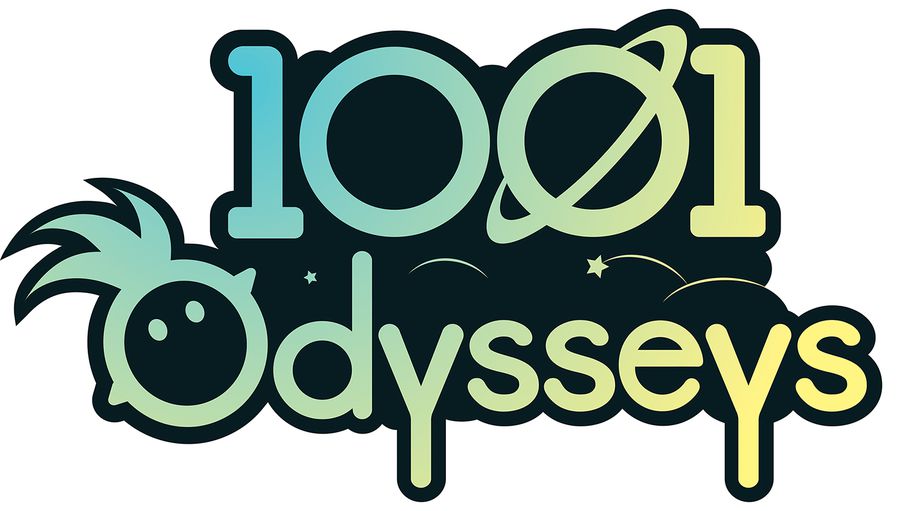 1001 Odysseys by Asmadi Games – This scifi-based, Arabian Nights-style co-op storytelling game featuring adorable creatures called Plumplins was on near constant demo. We got to play this at the Boston Festival of Indie Games back in September and quite enjoyed it, but it’s been in a pending state for quite some time. Originally slated to launch earlier this fall, it has been pushed to early January 2019 to factor in some exciting expansion developments which have arisen recently.
1001 Odysseys by Asmadi Games – This scifi-based, Arabian Nights-style co-op storytelling game featuring adorable creatures called Plumplins was on near constant demo. We got to play this at the Boston Festival of Indie Games back in September and quite enjoyed it, but it’s been in a pending state for quite some time. Originally slated to launch earlier this fall, it has been pushed to early January 2019 to factor in some exciting expansion developments which have arisen recently.
Bosk by Floodgate Games – This leaf-based area majority game about the changing seasons continues to impress, despite it still being in prototype form (a release is planned for late Q1 2019). It has an excellent table presence, and I was lucky enough to have already played it at BGG.Con. Otherwise I would have been very eager to arrange to try it here. It nevertheless was getting a steady stream of attention, even if half of the questions could’ve have been answered with, “no, it’s not like Photosynthesis”.
Coma Ward by Everything Epic Games – While these folks were showing off at least three current or upcoming titles, the one I heard people leaving the booth most excited about was Coma Ward, a horror-themed game that has nothing to do with vampires, zombies, or Cthulhu. It’s true! That alone should earn it some praise. In this game, players are patients who have woken up in a hospital with no memories and no idea why they are there, and only through a number of unfolding scenarios, you discover the real, haunting truths. It’s a very thematic game in the vein of Betrayal at House on the Hill, only darker, and I’m eager to explore this one further.
Dice Settlers by Board & Dice / NSKN Games – This is likely the last time these two European publishers will have separate booths as they have recently announced a beneficial merger between the two. Combined, this group had three major games to show off. The buzziest of these was easily the medium-weight Euro, Teotihuacan, of which they only had a couple dozen copies and all sold almost immediately. Similar attention was paid to the escape room adjacent puzzler Escape Tales: The Awakening, of which they sold through all of their advanced print run by the end of the weekend. In one of those curious instances of the PAX audience not being solely the entrenched fan, however, their third title, the dice pool building Dice Settlers, didn’t actually move as fast as the other two – likely as many didn’t know what they had in front of them. Worry not though: all three are due in US distribution hopefully by January.
Fireball Island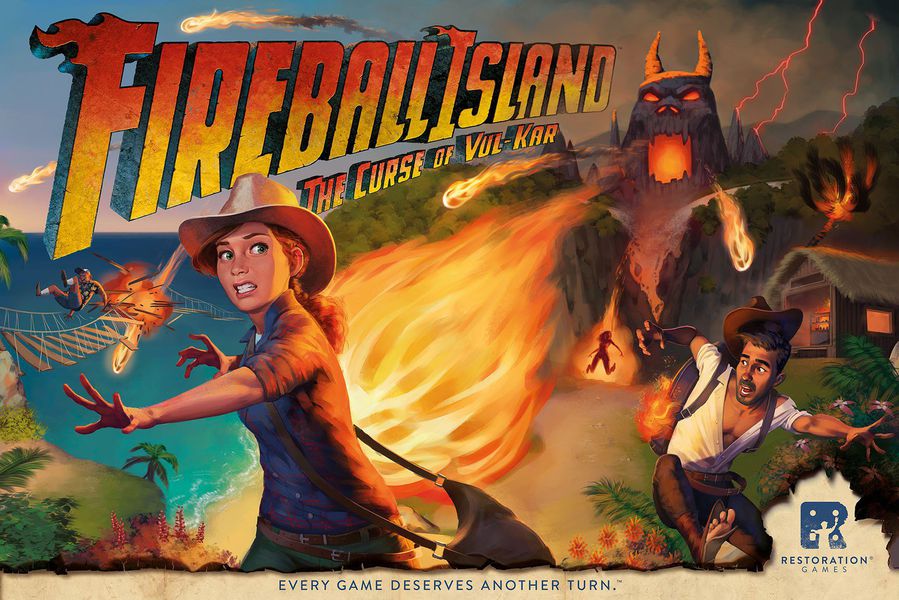 by Restoration Games – I don’t have a lengthy amount to say here except that if you wanted proof positive the effect of name recognition, you’d have to look no further than Restoration’s booth, where 95% of it was focused on showing off the newly released and revamped Fireball Island. There seemed to be constant foot traffic here, and it allowed those who hadn’t already backed the massively visible Kickstarter to get in on the marble-flicking quest for glory. Which many did.
by Restoration Games – I don’t have a lengthy amount to say here except that if you wanted proof positive the effect of name recognition, you’d have to look no further than Restoration’s booth, where 95% of it was focused on showing off the newly released and revamped Fireball Island. There seemed to be constant foot traffic here, and it allowed those who hadn’t already backed the massively visible Kickstarter to get in on the marble-flicking quest for glory. Which many did.
I had made a mental bet that this one would sell out too, but it surprisingly didn’t. Whether that was due to the price point for what is still seen by some as a purely kid’s game or the fact that they brought enough inventory to almost obfuscate the modest booth itself is hard to say, though the way so many other things were moving at this con, I’m assuming the latter.
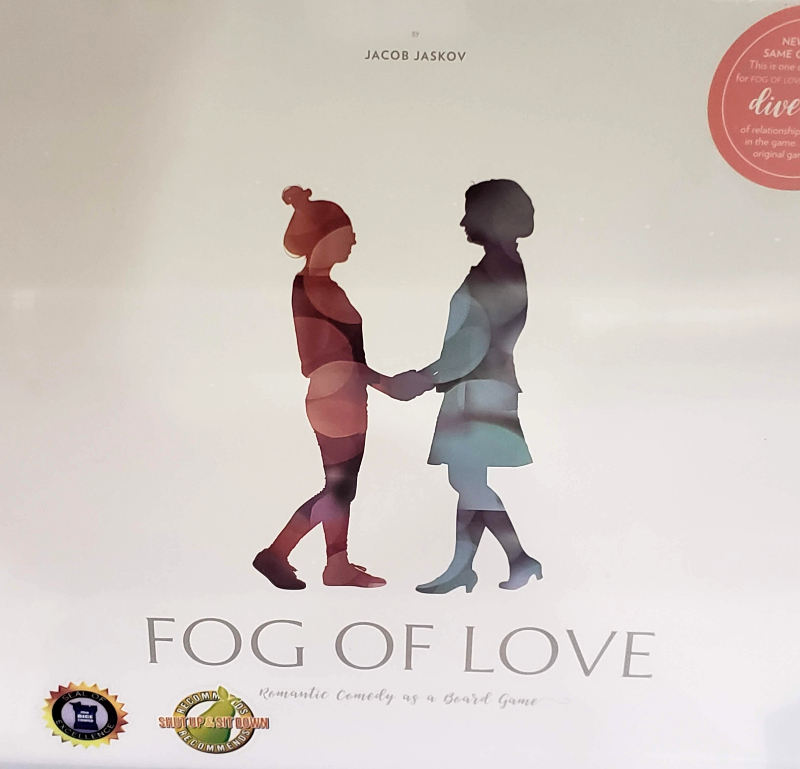
One of the new covers in the wild!
Fog of Love by Hush Hush Projects – One booth that was surprising packed nearly the entire time was Fog of Love. Sporting numerous demo tables as well as the new LGBTQ-friendly alternative box covers, this storytelling game of romance won and lost based on player decisions is as much about the experience as it is about trying to win, and I was happy to see an abundance of interest by attendees. I chatted with the game’s designer a bit about his own experiences with releasing the game, and gleaned three interesting pieces of information.
First, the recently announced expansion for the game should be out in Spring 2019. Second, while they’re still in early design stages, Fog of Love is intended to be the first in a trilogy of such games, with the latter two focusing around different stages in life and intending to invoke different emotional responses. Finally, while their initial experiment with being a Walmart.com online exclusive game has done well for them sales-wise, their sales in the US are still below their original estimates, whereas they’re above sales estimates in just about every other market the game is being sold. So either there’s something about the US audience that isn’t embracing the game as much, or (more likely), people aren’t aware that Walmart.com is the primary place to find it.
Gorus Maximus by Inside Up Games – This was a title to be seen first at Essen and then brought to the US afterwards, with what stock they had available at PAX being the remnants of what was originally air freighted retail and deluxe editions. This is is a fairly straightforward trick-taking game with brutal yet cartoony gladiatorial themed artwork by Kwanchai Moriya. Is it revolutionary as trick-takers go? No. In fact, it tends to be on the simpler side of the spectrum. Yet to me that only helps make it more accessible. When you combine that with the fact that it plays quickly, can easily scale up to 8 players, and has a couple unique twists of its own for the genre, it was worth checking out in my book. Enough so that I picked up my own copy, and of all the games at PAX that made it to my table, this one saw the most use.
Pipeline by Capstone Games – The Estates and Climbers were both on regular demo bookending both sides of the Capstone booth, and both sold quite well. Buttressed between the two though were frequent showings of their new heavy economic & spatial game Pipeline, which just wrapped up on Kickstarter. Which I was admittedly curious about based on the mix of gamers at this convention. But it didn’t seem to deter interest. I wasn’t fortunate enough to find the time for a demo myself, which is a bummer, but prior research had already told me this was my kind of game.
The Quacks of Quedlinburg by North Star Games – Say what you what: I still like the sound of ‘Die Quacksalber’ over ‘The Quacks’. But I digress. The North Star booth was expectedly busy thanks to their line of lighter game titles, though they were also focusing heavily on showing their evergreen Evolution series. The biggest surprise was that Quedlinburg was actually there in decent quantity – the first time North Star has had it available in the States. Though this classic looking European board game was getting more attention from the enfranchised half of the gaming crowd than from attendees writ large, which meant it didn’t move exceedingly fast. Which was fine with me. I’d yet to play this Kennerspiel winner because I didn’t import it, but now I can, and soon everyone else everyone can as well.
Sovereign Skies by Deep Water Games – While I spent a fair amount of time socializing in the Unpub room over the course of the convention, I didn’t actually play many prototypes (though one could have spent a majority of their time at PAX doing nothing but that if they so chose). One of the few I was able to get a session of, however, was the upcoming Sovereign Skies, the first original title from Deep Water Games. This is designed to be a roughly 45 minute space-based area majority game where players are moving around a star system using rondel movement and trying to establish majorities on different planets in order to score VP.
I lost horribly in my session but enjoyed my time. Look to the Skies of Kickstarter around March 2019 for this one, give or take a month, where we’ll likely have more to say on it then.
Spy Club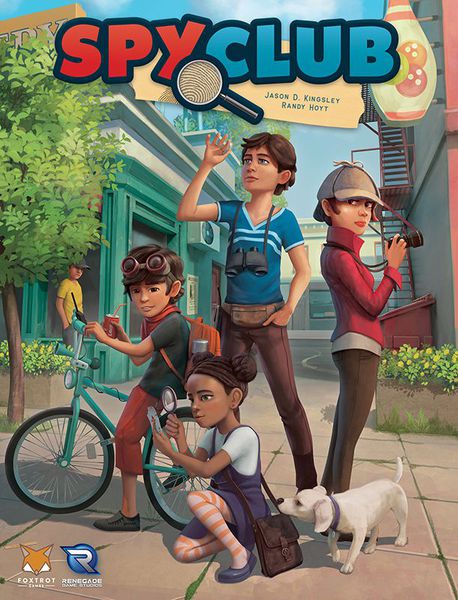 by Foxtrot Games & Renegade Game Studios – As a company who originally (and still principally) focuses on games on the lighter end of the complexity spectrum and who also puts out a couple dozen titles a year, PAX Unplugged is the kind of convention tailor made for them. Renegade is busy at nearly every con, but what I found so intriguing, even amusing, is that they were also generating consistent sales on pretty much on whatever they decided to put out for demo.
by Foxtrot Games & Renegade Game Studios – As a company who originally (and still principally) focuses on games on the lighter end of the complexity spectrum and who also puts out a couple dozen titles a year, PAX Unplugged is the kind of convention tailor made for them. Renegade is busy at nearly every con, but what I found so intriguing, even amusing, is that they were also generating consistent sales on pretty much on whatever they decided to put out for demo.
This was most evident with Foxtrot’s enjoyable kid detective co-op Spy Club and the reprinted Arboretum, but also Gunkimono, Spell Smashers, and Junk Orbit. The newly arrived Architects of the West Kingdom was moving well despite not being front and center, and even their Overlight RPG was getting inquiries. Ironically, and possibly due to it also not being the main focus, one title that didn’t seem to by flying off shelves was the upcoming Passing Through Petra – which is the opposite of BGG.Con a couple weeks earlier, where it sold out fairly quickly.
The Reckoners by Nauvoo Games – I’m mostly noting this highly produced licensed co-op in my recap for two reasons. First, demonstrating just how much product was moving at Unplugged, they sold out of every copy they brought – which was a not-insignificant amount. The Reckoners is not exactly a $20 game, but its table presence and cooperative style really seemed to resonate with attendees. They also sold out of their much smaller team-based party game, CrossTalk. So, kudos there. Second, I also got word that the Nauvoo team has 2-4 projects lined up for 2019, including a really interesting twist on a worker placement game, and a second Stockpile expansion. Yay!
Root by Leder Games – With prime real estate, wonderful artwork adorning both game and accessories, and an understanding that this was the same people who did Vast, Leder Games had a stellar convention. And they seemed to expect that they would: they apparently brought every last copy of the game still available – the last batch of a 20,000 copy print run – to the convention. They sold all of them, as well as most of the Vast expansion materials they brought as well.
Make no mistake: Root is going to end up on a lot of game of the year lists for 2018, and the interest in the game from casual and enthusiast gamers alike only seems to back this up. Case in point – while a 20k initial print run is impressive on its own, the second print run of 30,000 copies, currently on a boat heading for the States, has already been sold out straight into distribution. If you’re wanting a copy, be sure to check out your retailers of choice and preorder if possible, because otherwise you’re looking at another 5-6 months after that before the next print run would be due.
Stonehenge and the Sun by itten – When I first arrived on the PAX floor Friday, I immediately ventured over to try out the fully set up copy of Stonehenge, which is coming to Kickstarter in a matter of days. In this blissfully different dexterity game that relies neither on speed nor stacking things, your goal is to add a new henge piece to the board and then try to thread a weighted ball between one side of that piece and a space directly across the board (not unlike a clock pendulum). Knocking pieces off the board scores you negative points, so you want to have the lowest negative score possible in the end. If you’re lucky you may even get a nice-looking henge to admire at that point as well…but don’t bank on it. itten is a small Japanese game company, which almost seemed out of place for Unplugged, but it made more sense when I learned that several on the booth organizing team are big fans of their titles and made a concentrated effort to have them come over for this convention. A fact I and many others were appreciable of.
Tiny Towns by AEG – Technically, the major release at PAX for AEG was Scorpius Freighter, a Firefly-esque themed game that was officially an Essen release and first made its US presence at BGG.Con, but this is the first place where it was seen in the larger wild. Yet it amusingly took a back seat to several other already released AEG titles, including War Chest, Cat Lady, and Space Race, as well as near-constant demos of their upcoming game Tiny Towns, due out around April 2019.
Tiny Towns is a game that’s part Tetris, part Karuba, and part Welcome To. In this game, your goal is to build up specific structures on your town grid for points, but different structures require foundational resources arranged on your board in a specific way, which is handled partially by your own tactical decision-making and partially by whoever’s turn it is stating which resource must be added to your board this turn. It’s a short but engaging game that I think has the potential to do well, which is certainly good news for the designer: not only is it his first game, it was one of his first pitches, which made at PAX Unplugged last year, and was one of his first major board game conventions.
Turin Market by Jordan Draper Games – Known best at this point for their ‘Tokyo series’ games such as Tokyo Metro and Jidohanbaiki, Jordan Draper had no shortage of games to show off. Part of that was because they were helping sell itten’s titles on their behalf in addition to their own wares, which gave the whole booth a wonderfully indie vibe with plenty of games you won’t see in retail anytime soon (with the exception of Tokyo Highway). So I grabbed a game or five. One of those was Jordan’s smaller title, Turin Market, a 45ish minute game of commodity speculation and secret bidding. And it lives up to that intention. The game is fairly easy to each, moves briskly, and is absolutely brutal if your betting goes awry. I even got to play it a couple times while I was there, which is never a guarantee at any con.
Victorian Masterminds by CMON – Once a miniatures-only model company, CMON has made extensive inroads in recent years with a growing catalog of non-minis board games, including more than a few on the lighter, more accessible end. Both sides of their company were being regularly demoed at the booth for PAX, but while the expansive minis games like Fire & Ice made modest sales, they had completely sold out of nearly all of their lighter titles by the end, including Potion Explosion, Gizmos, Railroad Ink, The Grizzled: Armistice Edition, and what little they had of the marginally heavier Newton. They also had on sale for the first time copies of their new hour-ish steampink worker placement game Victorian Masterminds, which had a limited run at Essen. I was lucky enough to try this at BGG.Con and enjoyed it, so I didn’t have to edge my way into the constantly-busy demo table at PAX. This title too sold out by the way, but a retail release is slated for January.
The Location
PAX Unplugged is situated in Philadelphia, making it an ideal location for a wide swath of people to congregate in and has done so for, well, centuries. Unplugged’s downtown Philly destination is centralized enough to entice a wide range of people to attend using multiple mediums. Traveling by car, a six hour driving radius around Philadelphia captures people from Youngstown, Ohio, to Norfolk, Virginia to points in New Hampshire – encompassing not just the entirety of the future BosWash megalopolis but nearly the entirety of the Northeast and MidAtlantic states. That alone casts a wide net on a sizable percentage of the population.
Flying is also pretty accessible, as Philly is reachable by nearly every major US city east of the Mississippi in a two hour or less flight. It’s also an American Airlines hub, guaranteeing regular flights to and from plenty of destinations.

Housing is likewise (relatively) manageable. Situated in the downtown area, the urban apparatus around the Philadelphia Convention Center is able to handle crowds much larger than what PAX-U is currently throwing at it, making it – at least for now – not that difficult to find nearby hotel space, with cheaper options available the further away from the convention you get. You’re still looking at a major US city though, so don’t expect rates to drop too too much.
All in all, this convention is set in a decent location for half the country to reach easily and has the space to grow. I was able to drive down, find parking, and get checked in with no problem. Aside from it being Philly.
I kid.
Mostly.
Free Play Areas
At present, even for its size of around 20,000 attendees, PAX Unplugged had ample room to actually, you know, play games. This seems self-evident, but at expo shows like PAX and Gen Con, that is not a guarantee. This convention clearly put a lot of effort into cultivating areas to play in, including the playtesting UnPub room, Classic Cardboard, which encourages you to play cheeky and / or classic games from the past, and numerous demo areas. The largest of these however, by far, was the free play area. This took up an entire 1/3 of the large hall with open tables and included both a meticulously curated library to check out games and an extensive First Look section where you could take a crack at some of the most recent games to hit the market – including many Essen releases.

Now where did I leave my friends parked…
PAX clearly put a lot of working into making the free play area open and accessible (as one would hope for a board game convention), and they were quite successful. The folks organizing that part of the convention really did a decent job, and that aspect has come a long way since my first free play experiences at PAX East a number of years ago. It’s evident that it borrowed several organization elements from other conventions, but success breeds success.
The one thing it could still use is some means of navigating that part of the convention to find people, whether it’s colored tablecloths or some kind of section labeling. The free play hall is large enough already where that is necessary, as finding people merely by sight line is not an option.
Food!
A convention’s reputation thrives or suffers based on its attendees’ access to decent food options. Thankfully, Philly has you covered here too. There is an extensive variety of eateries and restaurants all within walking distance of the convention center, including both take-out and sit-down options. Even more options are available a few blocks further out, accessible by a short car ride, including Thirsty Dice, a brand new board game cafe to the city.
The hall itself also had food options from inside the hall itself, but those were…well, we’ll get to that.
It’s PAX, But Also Not PAX

It’s like an iceberg: the part you see at the top are the heavy enthusiasts. The, much much larger part underneath? All other gamers.
The most striking part about PAX Unplugged – by far – is the attendee base itself. While PAX no longer officially publishes attendance numbers (supposedly as a means of preventing inter-PAX convention comparisons), unconfirmed numbers from its debut last year put unique attendees at around 15,000 – instantly making it the third largest board game convention in the country. What’s more, supposedly more than half of those who showed up for the inaugural release last year had never attended a board game convention before.
An often forgotten fact within the enfranchised BoardGameGeek-using crowd is that we are but a small percentage of the overall board game audience. The vast, vast majority of gamers out there – the ones who buy games infrequently and are often derided as only liking mass market titles – have never even heard of BGG, let alone visited it with any frequency. It’s estimated that of the entire board game population, the hard core hobbyists that interact on places like Twitter, Reddit, and BGG forums only make up about 10% of the overall player base. The other 90% often go unnoticed, excepting those occasions when a game makes it into larger pop culture places like television shows and stores like Target or Barnes & Noble.
It was this part of the gaming population that made up a majority of those who attended last year, and I would hazard the numbers aren’t substantially different in 2018. And it was noticeable for a few reasons.
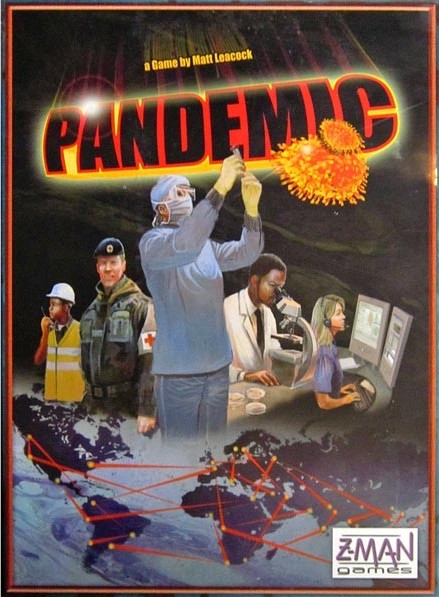
Tell me about this Pandemic game…
For one, there was a general air of curiosity by many attendees; people were walking up to booths and asking questions about publishers’ evergreen titles with nearly as much frequency as their latest ones. This portion of the crowd was just as unfamiliar with Forbidden Sky as Forbidden Island, and that’s not a bad thing. It’s good for consumers because they were able to broaden their gaming horizons without preconceived notions about the New Hotness or the latest hype and were allowed to explore games solely based on what seemed interesting to them. And it was good for publishers because while selling their latest product is almost always the main focus, it was a reminder that there is a wellspring of potential sales out there if they can be properly reached.
The other main difference was it that made for an atmosphere of mellowness, at least compared to other PAX events. PAX-U was still very much a PAX event organizationally and functionally, but there was a level of excitement and joviality common to most game conventions that made this one feel less…PAX-y. You didn’t sense the same degree of pervasive bro culture fulminating just beneath the surface that often permeates most larger video game conventions. Instead it felt like, well, a typical board game audience. (Such attitudes still here as well, but in this hobby it’s generally less in both quantity and concentration.) In a lot of ways PAX Unplugged has created the same split focus approach between vendors and free play that Origins offers, except that a sizable part of its audience, at least for now, is less entrenched in the normal board game milieu of similar sized cons.
It made for an interesting mix between gaming veterans and newcomers that was, honestly, a little refreshing.
Sales Were Solid

It wasn’t this bad by the end. But it’s closer than not…
Two things are undeniable about PAX events. The first is that PAX organizers, for the most part, know how to run a convention. It’s not always perfect, but they are able to foster devoted excitement for their events in ways few other multi-convention organizations can. Part of that is brand awareness and a baked-in audience at this point, yes, but at the same they always seem to find a way of tapping into geek culture in a way to drive interest in their events. The second, which builds upon the first, is that their audience has no problem spending money. These are conventions that have a line for its own merchandise after all.
Board gaming is ostensibly a luxury hobby, and tabletop gamers are usually willing to drop down money for something they want. PAX fans, however, take spendthrift to another level, largely operating at a crossroad between passionately geeky for their hobby in general and the free-wheel spending common in the tech geek world.
Basically, this aforementioned untapped market of gamers were willing to come and drop loads of cash without thinking twice about it. To a point where by Sunday afternoon, booth after booth after booth was reporting that they sold out of all or most of what they had brought with them – and not necessarily just their new titles. It wasn’t universal of course: some vendors brought much more inventory than others, and some games simply didn’t resonate with this crowd for one reason or another. In general, though, for most publishers it was a solidly successful convention for sales, and for that I was quite happy.
The Bad
If you’ve ever read some of my previous annual recaps from attending PAX East, you know that there are some perennial complaints I have with that convention, not only in terms of organization and the scope of the tabletop area, but in terms of paneling, ticketing, and an attitude at this point that the convention ‘is what it is’. So while I came in to this convention open-minded, I also was prepared for making a laundry list of PAX-related complaints. But…I didn’t. One of the most surprising things about a second year convention of this scale, and one that varies from its video game focused siblings, is that I admittedly don’t have a long list of truly negative things to say about PAX-U. Which in of itself is a testament to the folks running this one.
That said, there are a pair of issues that definitely stood out.
Food & Water Scarcity
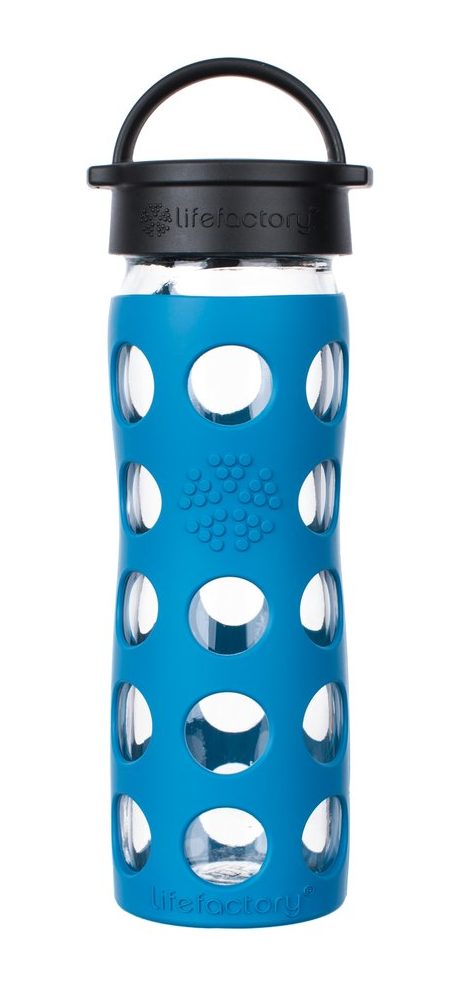
Just need to find a place to fill it up…
One was easily the issue of food & water scarcity at the convention. On the surface, the convention-based food options seemed like they’d be well orchestrated, with most of the kiosks positioned in its own miniature food court on the floor above the halls, offering a variety of typical convention style foods at convention style prices. The problem was…they kept running out. By both Friday and Saturday afternoons, well before the 6PM expo hall closure, nearly the entire food court ran out of food to sell. Which is definitely a Problem.
It was likely basing their supply numbers on last year’s attendance, which had clearly grown, and they were woefully unprepared for demand. I don’t foresee this being a long-term problem, as it seems like something that can be easily learned from, but it bears mentioning.
On a similar front, water options were a bit lacking as well, though this too was sort of par for the course at large convention halls versus, say, hotel ballrooms. Aside from buying bottled water or bringing your own, your only real option was to seek out one of the bathroom areas and hope that it had a working drinking fountain. It wasn’t the most prohibitive option, admittedly, and given the size of the audience I’m not sure if there really is a better alternative. Yet water access is a fairly common thing for conventions where the focus is on playing games versus buying, so perhaps there is a way of finding a happy medium there eventually.
Again With The Metal Detectors
Originally PAX didn’t used to insist on using metal detectors, but a few years ago, not long after the attacks in Paris and Brussels, they started requiring them out of an abundance of caution. I, like most, had hoped that they were to be a temporary fixture, but it seems like they are going to become a recurring PAX feature.
Here’s the problem though: they’re dumb. Dumb, dumb, dumb. This is security theater at its most banal. While obviously there mostly as a deterrent for someone bringing in dangerous things, all they really do is make it annoying and even prohibitive to get in during the morning or leave for lunch without wasting your time. Bags are given a cursory check at best, and they even made exhibitors go through the same process with morning equipment, which is just silly. Trust me, if an exhibitor wanted to bring in something illicit, they wouldn’t use the front door.
I’m not sure if this is a convention hall requirement, PAX is insisting on them for liability reasons (which is my guess), or concern about the convention area’s ample homeless population, but if someone knows, please enlighten me. In any case, ultimately the metal detectors used here were inefficient, time-wasting, and didn’t make a single person feel any safer than they already did.
The Mixed
The Timing
Last year, the inaugural launch of PAX Unplugged fell squarely on the same weekend as BGG.Con, forcing many longstanding attendees and media to choose between which convention they’d rather go to. The PAX organizers were regretful of it being the only weekend available that fit, and they promised going forward they’d try their hardest to make sure that didn’t happen again. Which is all and good for those of us with the capability and desire to attend both. However, one does have to wonder about where PAX is situated in the calendar year.
On the one hand, it’s nice that PAX isn’t another spring or summer convention, which would put it in direct competition with both regional and larger established board game conventions. The end of November also makes sense from their own scheduling perspective, as it doesn’t compete with PAX West in August/September, South in January, or East in March/April, forcing them to strain their brand or overstretch their resources. Beyond that, it’s a decent sized board game convention that happens to be situated after Essen, which means that many publishers have a previously unavailable opportunity to get eyes on their Q4/Q1 releases without solely catering to the most diehard and privileged portions of the hobby to drum up attention. Especially for an audience that doesn’t mind spending.
On the other hand, it can be a tricky part of the year for a lot of people. For one, while it’s great they don’t wish to step on BGG’s toes, it’s still a mere two weeks after that convention, which still means in the long run most people with limited budgets are going to have to choose between the two. And second, that intervening week just happens to be Thanksgiving. Which means if you’re one of the millions of people who travel to see family for the holiday, it may not be that easy to turn around a week later and do it all again for a game convention. I’m sure a lot of thought went into when to situate the convention, and I’m lucky enough to be in a position at the moment where I can swing both, but I also worry about those who aren’t nearly as fortunate going forward.
The Size Already
That said, growth concerns is clearly not something they’re worrying about at Unplugged, at least in a negative trajectory. Last year’s launch had approximately 15,000 show up, and early armchair estimates are that 2018 will see numbers in the low 20s – instantly making it the second largest board game convention in the US. In its second year. Which is crazy. Although I wasn’t present last year, numerous people remarked that both the expo floor and free play areas grew by close to 30% in a single year, taking up the entirety of Halls A-C. PAX, however, obviously has ambitions to cultivate and grow this convention right. The Halls go out to I for instance, which means at present Unplugged is only using about 1/3 of available the convention center space. So there is definitely room to build this out going forward.
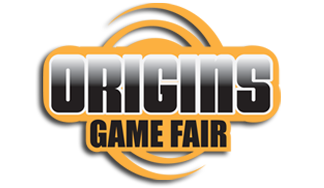
Origins, consider yourself officially challenged
Some posit that if they did it right, within 5-7 years it could start rivaling Gen Con as the premier US board game expo. While that remains to be seen, I can definitely get behind the argument that it’s already in serious contention of unseating Origins and its general relevance in the board gaming convention hierarchy.
Origins has a more optimal calendar date in the release cycle and is several days longer, giving it a more laid-back vibe, but it’s also been beset in recent years with poor organization, a problematic award process, and its handling (or lack thereof) of harassment reports. Origins is aimed at more of the enthusiasts than the casual gamers, but Unplugged has shown that doing both is definitely possible. If Origins wants to be viable in the long run, it’s going to have to shake off its own complacency.
On the other hand, I’ve also anecdotally heard concerns in the opposite direction, in that Unplugged may already too big for some people’s tastes, either in terms of finding people to socialize with or the vendor area itself. It’s small enough still that you can bump into people without trying, but already large enough that you’re not guaranteed to do so either.
Unplugged will inevitably have to decide which direction it’d prefer to move – larger scale or capping it at something close to what it has now. I could see it go either way, but my instincts all say expect the former. And I for one don’t find growth here to be a bad thing.
The Midnight Conundrum
This one is pretty small, and not even technically PAX’s problem. But it’s something I heard a lot, so it bears noting. Like all other PAX conventions, everything shuts down at midnight, forcing a an exodus of a still sizable number of people out of the convention halls. Which usually means back to the hotels to sleep. Which is, you know, probably the healthier option for us all in the long run. But for those who want to continue playing beyond midnight (and there are many), your options are seemingly limited to individual hotel rooms, bars, or hotel lobbies – if they’re set up for such things. Given the relative proximity of many area hotels, one thing I would love to see is for hotels to lean into the convention a little more like at Gen Con and make lobby or other open area space more accessible for gaming. Some hotels may have started doing this already, but it’s not widespread. At least not yet.
And so it came to pass, the CR’s first trip to PAX Unplugged. All in all, I have to admit I’m pleasantly surprised by what I found in Philadelphia. I think there’s a deep well of potential with this convention if it’s cultivated right, and for the sake of the hobby’s growth, I hope it is. Unplugged in many ways is PAX in name only, though that name brings with it an often-overlooked part of the board gaming collective who are excited to learn all about games – including titles many of us diehards take for granted already – and willing to spend freely. It has a decent mix of events, panels, and has thus far found a healthy balance between gaming and selling that I think speaks to a lot of people.
Indeed, it seems to be a nice hybrid between cozy smaller regional conventions and the frenetic madness of something like Gen Con. Like Origins, it has that nice feel of not too big, not too small, and it has copious things to keep you occupied.
There were plenty of cool games to check out, a host of faces I’m always happy to see, and an enthusiasm for board gaming in general that bodes well for this convention’s future. I was quite happy with my trip to Philly (bonus points for being able to avoid annoying Eagles fans too), and I’m already interested in Going Unplugged in 2019 to see what lies next.
Photo Credits: Pax Logos by PAX Site; Iceberg by OSU; Car Park by John Wardell; Shelving by Tom Sheep; Philadelphia Skyline by Visit Philly.


